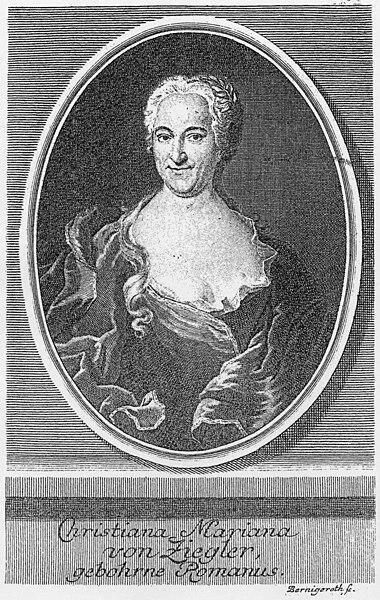 |
| Christiane Mariane von Ziegler, librettist |
Born June 28, 1695 in
Leipzig, Germany, Christiane Mariane von Ziegler grew up the wealthy daughter
of a mayor, but by no means did that ensure her an easy life. At age 11, her father was imprisoned for 40
years until his death due to a political controversy, and by her early 20s, she
had been widowed twice, with a deceased child from each marriage. By age 27, however, she ran her family’s
house and there provided a lively, cultured atmosphere for artists to socialize
and share ideas. These gatherings were
warmed by her “chipper” personality and prominent sense of humor, and she was
known as the life of the party wherever she went. One frequent visitor was Johann Christoph
Gottsched, an editor of a magazine directed towards women, and he encouraged
her to publish her sacred and secular poetry.
In 1728, she released nine cantata texts, verses framed by biblical
texts and chorale stanzas, with one of them becoming Bach’s Cantata No. 175. In Leipzig, the Bach and Romanus families
were very close, and the composer and librettist were probably well
acquainted. In addition to her many
accomplishments, she was the first female member of Gottsched’s literary
society and German poet laureate. When
not writing, Ziegler played keyboard instruments, flute, and lute while
singing, spoke French effortlessly, and enjoyed shooting crossbows and
pistols. In 1741, she did marry again
for the last time, and passed away in 1760 at the relatively late age of
65.
For every Sunday during
the church year (besides Lent), Johann Sebastian Bach’s position as cantor
involved composing, rehearsing, and performing an approximately 20-minute
cantata between the Gospel text and the sermon with a choir and small
instrumental ensemble from the adjoining school. Originally, this cantata was premiered on May
22, 1725, the Tuesday after Pentecost, which shares a Gospel reading with that
of Easter 4 (John 10:1-10). In order to
evoke a pastoral scene to townsfolk sitting in St. Thomas’ Church, Bach brings
in three recorders to play a simple, charming motif while the tenor sings “He
calls His sheep by name, and leads them out” (John 10:3). Then, the alto soloist sings a Ziegler
original text, “Come, lead me!” which uses the same instrumentation. With a 12/8 pastorale-style meter, recorders
emulating shepherd’s pipes, and a “wandering” motif reminiscent of a lost
sheep, Bach paints the listeners into the countryside, a place of potential
rest but also lurking danger. Chromatic
twists and wrenches depict the utter perdition of the sinner apart from
Christ’s justification, and musical “sighs” demonstrate the believer’s fervent
hunger for guidance. “Where shall I find
You?” the tenor begs next in an unsettled, zig-zagging recitative, answering
his own question in the successive aria, seeing the Lord entering in by the “right
gates,” and responding to His “lovely voice.” The alto then reads John 10:6, “But
they did not grasp what it was, that He had said to them,” and the bass
comments that we, too, do the same when God’s truth confronts our blind
reason. In the end, surrounded by a
scalloped-edging of strings, he exhorts the soul to mark Jesus’ words for its personal
welfare. Accompanied by trumpet
fanfares, the adjoining aria by the same calls upon his ears to open for
Christ, who promises blessings to those who bear the cross in faith. The concluding chorale, to the melody of “Komm,
Heiliger Geist, Herren Gott,” declares full confidence in God’s leading by grace
through faith in the Word, the true star to light the journeying road.
What message could and
should Christians take away from this piece of art? Primarily, they should be reminded of their
deep need for forgiveness and Christ’s guidance through the perils of life
under the cross. Underneath, though,
they should also be encouraged by the example of faith demonstrated by both
Ziegler and Bach – though living under a heavy cross, Ziegler sought strength
in the Gospel promises, and thus was able to write such lyrics with full
confidence despite hardship. Bach
likewise knew his Bible extensively and understood precisely what musical
elements he could incorporate to accentuate the message to even a casual
appreciator. Today, we thank God for
their creative gifts, and from them draw inspiration to glorify Him with our
own – even on the crooked passages and shadowed vales of earthly life.
 |
| Garden in Leipzig, Germany |
No comments:
Post a Comment